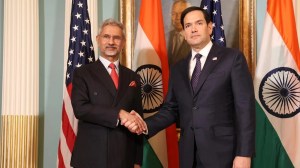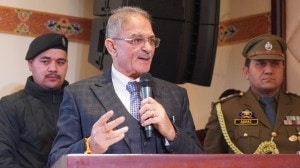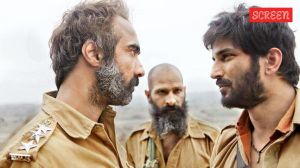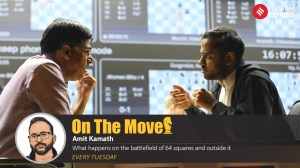Lahore, Agra, Srinagar
You can look at the prime minister8217;s latest initiative on Kashmir and talks with Pakistan in opposite ways. The first is the more obvio...

You can look at the prime minister8217;s latest initiative on Kashmir and talks with Pakistan in opposite ways. The first is the more obvious and therefore apparently the more logical one: that he must be out of his mind to start this all over again just when a year-long election season is about to begin. The other, and the more optimistic one, could be that realising he cannot let things drift and that the closer he gets to elections, the less time he will have to bring about any real movement, he has taken the initiative now.
It is no secret that he has wanted so keenly not merely to address this issue but to make its resolution the high point of his five and a half decades in public life. Whatever the public image, it also applies to L.K. Advani. They both want an end to confrontation and are also aware that besides8212;and after8212;them there aren8217;t leaders with the kind of credibility required to make any progress at all. This is, therefore, a deliberate and strategised move shorn of the drama of the Lahore bus ride and the suddenness of the Agra summit. It8217;s come, quite deliberately, in the midst of a parliament session, giving the prime minister the opportunity to explain the move immediately before the nation. It8217;s also been free, therefore, of the kind of suspicion that all such moves that are seen to emanate from back-channel diplomacy always generate.
The one uncertainty that now remains, though, is whether the prime minister will be able to persist with this, particularly if the response from Pakistan is qualified or if incidents continue to take place in the Valley. Every new incident will encourage the Thackerays and the Singhals and serve to deny the prime minister the political space he needs on his own side of the political pitch. You could expect, however, that with Armitage on his way now and other powerful Americans expected to follow soon, the pressure on Pakistan to refrain from ruining the momentum will be enormous.
The key to figuring out whether Vajpayee8217;s third initiative is less or more likely to succeed than the other two is understanding why and how those failed. The common strand between those two was haste and lack of preparation. Lahore came at a time when the mood in India was positive. There was a groundswell of support for reconciliation. But Nawaz Sharif had neither taken his power structure into confidence nor prepared even his own partymen for the change. That Kargil happened meanwhile and destroyed the Lahore process is incidental because, so suspicious was Pakistan8217;s own establishment of what was going on that if their troops had not already been sitting across the LoC they would have done something else to nix it.
At Agra, in some ways, the boot was on the other leg. Actually, the Agra story is more complex. Contrary to the impression that gathered later that Advani was opposed to the summit, the fact is that the initiative for it had actually come from him following several approaches from the then Pakistan high commissioner, Ashraf Jehangir Qazi, who argued repeatedly that Musharraf, being smart, and being a soldier who had seen the violence of war, was actually a changed man who wanted peace. Where the plan came unstuck was in failing to take our own foreign service establishment along. The MEA was suspicious and insecure from the very beginning and so were several other key figures in the cabinet. The Pakistani response, that the talks would be without a structured agenda, that the only point to be discussed would be Kashmir, that there was no need for any preparatory meetings, vitiated the mood further.
Because India had gone out on a limb already, it was difficult to withdraw the offer of talks and, given the Pakistani establishment8217;s well-known lack of intellect where bullheadedness is routinely confused for strategy, it was for Islamabad to misread this Indian predicament as weakness. That Indians did not have the stomach to handle suicide attacks, that they were suing for peace and so on. I.K. Gujral had got it absolutely right when he said on the eve of Musharraf8217;s visit that his attitude showed as if he was visiting a defeated nation. That it still took that silly outburst at the breakfast with Indian editors in Agra to finally ruin the summit only underlines the distance to which Vajpayee was willing to go in furtherance of his own idea of peace.
The situation today is different in three crucial ways. First, of the three moves Vajpayee has made, this is the most public and transparent, made in Srinagar with Parliament in session. Second, the international environment has changed dramatically between Agra and now. Despite so much of our political class behaving like some kind of Saddam Fedayeen the relationship with the US is intact in substance and international concerns over stability and fundamentalism in Pakistan converge entirely with India8217;s. But third, and most important, Vajpayee has made this move from a position of strength unprecedented in the past decade and as yet another step in a complex process that began last year with the elections in Kashmir.
So fast has the pace of events been that we have never really paused to understand how significant a turning point this Kashmir election has been in our history. I would even argue that it is the third most important gain of our independent history since the liberation of Bangladesh and the Shimla accord, the other one obviously being the ending of terrorism in Punjab. It8217;s given India8217;s case on Kashmir the kind of credibility it had always lacked, and the people of the Valley the feeling that if they hated a despot the better way of getting even with him was braving the bullets to vote rather than taking to the Kalashnikov. Even the embarrassment of the Gujarat killings has failed to rob India of the credit for this. This was accompanied by some really deft management of a complex military-diplomatic strategy. It is simplistic to dismiss this merely as coercive diplomacy. When those in the loop write their memoirs they will tell you that there were phases during the year when the military muscle-flexing was for real and retaliation a realistic option. It was a formidable challenge to control and manage this strategy and hold one8217;s nerve through it. But this will always be the NDA government8217;s greatest achievement.
The result is this remarkable turnaround. Until just two years ago, India was saying repeatedly it wanted unconditional talks on all issues but the Pakistanis would respond by asking for concessions first: Stop human rights abuses, reduce force levels in Kashmir, and so on. And lately? It8217;s the Pakistanis who8217;ve been asking for unconditional talks while India has been first seeking an end to terrorism.
Diplomatic points apart, on the Kashmir battlefield, Indian armed forces casualties in 2002 have been less than 40 per cent of the previous year8217;s while many more terrorists have been killed. And this includes casualties sustained in the frequent exchange of fire across the LoC during the build-up. But the most important point is one that seems to have escaped everybody8217;s attention.
It is for the first time since Partition that the per capita income of Pakistan has fallen below India8217;s. Until 2002-3, the average Pakistani was always more prosperous than the average Indian. In fact, when I first visited Pakistan in 1985 this difference in incomes was so visible it dazzled you even at first glance. If the Pakistanis have meanwhile squandered such a huge headstart, it is in no small measure the price they have paid for following this foolhardy 8220;strategy8221; of terror and subversion and it has brought them no closer to grabbing Kashmir than before. The Pakistanis would not have slipped like this if they did not perpetuate this blood feud, and imagine where India would have been if it had found a way of ending it. That India has been able to grow and improve the lot of its people, in spite of being bled in Kashmir, speaks well for our own resilience. What both sides need to see now is what their fates could have been without this blood feud. That8217;s the point Vajpayee underlined at Srinagar earlier this week. It would be easy enough for even Musharraf to understand that, if only his establishment could grow out of its cantonment mindset.
E-mail the Author
- 01
- 02
- 03
- 04
- 05































